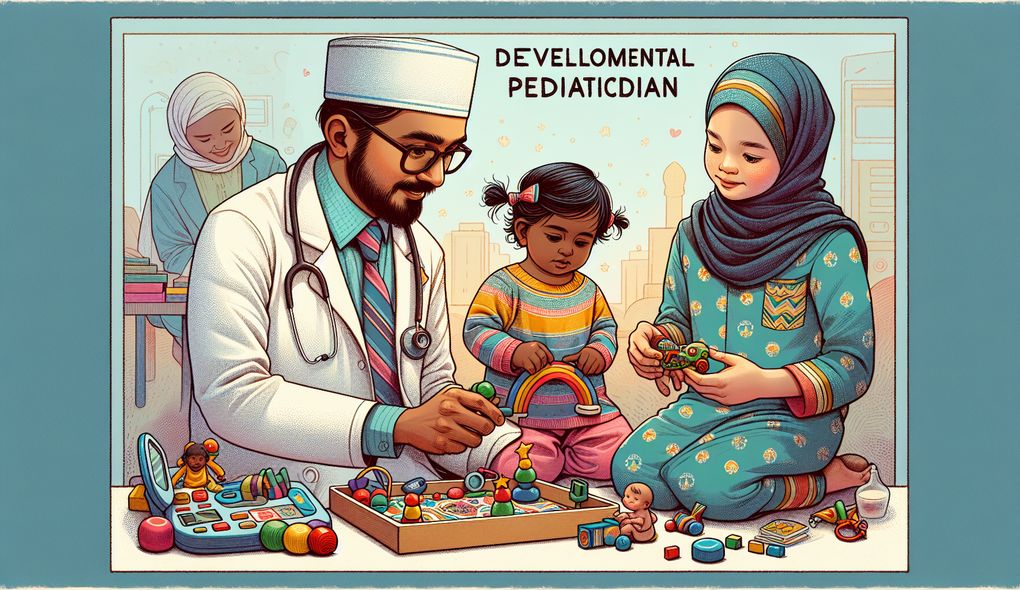How would you approach diagnosing a child with a developmental disorder?
SENIOR LEVEL

Sample answer to the question:
To diagnose a child with a developmental disorder, I would start by conducting a thorough assessment of the child's developmental milestones and behaviors. This would involve gathering information from the child's parents or caregivers, as well as observing the child's interactions and behaviors. I would also review any medical records and previous assessments that have been done. Based on the information gathered, I would then develop a comprehensive treatment plan that addresses the specific needs of the child. Throughout the process, I would collaborate with a multidisciplinary team of professionals, including psychologists, speech therapists, and occupational therapists, to ensure a holistic approach to diagnosis and treatment. I would also provide ongoing support and education to the child's family to help them navigate the challenges of raising a child with a developmental disorder.
Here is a more solid answer:
Diagnosing a child with a developmental disorder requires a comprehensive approach that combines clinical expertise and a multidisciplinary team. Firstly, I would conduct a thorough developmental assessment using validated assessment tools and techniques, such as the Autism Diagnostic Observation Schedule (ADOS) and the Bayley Scales of Infant and Toddler Development. I would also gather information from parents, caregivers, and teachers to gain a holistic understanding of the child's developmental history and current challenges. Additionally, I would review medical records and previous assessments to gather relevant information. Based on the assessment findings, I would analyze the data and formulate a diagnosis, taking into account the diagnostic criteria specified in the DSM-5. I would then develop an individualized treatment plan in collaboration with a multidisciplinary team of professionals, including psychologists, speech therapists, and occupational therapists. This plan would address the child's specific needs and target areas of developmental delay or impairment. Throughout the diagnostic process, I would ensure clear and effective communication with the child's parents or caregivers, providing education and support to help them understand and navigate their child's developmental disorder.
Why is this a more solid answer?
The solid answer provides a more detailed and comprehensive approach to diagnosing a child with a developmental disorder. It demonstrates a deep understanding of the skills and qualifications required for the position, such as the use of validated assessment tools, collaboration with a multidisciplinary team, and effective communication with parents or caregivers. However, it could still benefit from providing specific examples of assessment tools and techniques that the candidate has used in their previous experience.
An example of a exceptional answer:
When diagnosing a child with a developmental disorder, my approach is rooted in a patient-centered and holistic perspective. I prioritize building a strong rapport with the child and their family, creating a safe and supportive environment for them to share their concerns and observations. I take the time to listen actively and ask open-ended questions to gather comprehensive information about the child's developmental history, social interactions, and cognitive abilities. Additionally, I conduct standardized developmental assessments, such as the Mullen Scales of Early Learning or the Childhood Autism Rating Scale, to evaluate the child's strengths and challenges across different developmental domains. I also collaborate closely with other professionals, including psychologists, speech therapists, and educators, to gain a multidimensional understanding of the child's needs. Furthermore, I am committed to ongoing education and staying up-to-date with the latest research in the field of developmental pediatrics. This allows me to provide evidence-based interventions and treatments that are tailored to the unique needs of each child. Lastly, I believe in the importance of empowering parents and caregivers through comprehensive education and support. I provide them with resources, strategies, and guidance that enable them to actively participate in their child's therapeutic journey and make informed decisions.
Why is this an exceptional answer?
The exceptional answer goes above and beyond in providing a comprehensive and detailed approach to diagnosing a child with a developmental disorder. It highlights the candidate's patient-centered and holistic perspective, as well as their commitment to ongoing education and collaboration with other professionals. The answer also emphasizes the importance of building a strong rapport with the child and their family, as well as empowering parents and caregivers through comprehensive education and support. Overall, the answer demonstrates a deep understanding of the skills and qualifications required for the position, and it showcases the candidate's passion for helping children with developmental disorders.
How to prepare for this question:
- Familiarize yourself with the DSM-5 diagnostic criteria for developmental disorders, such as autism spectrum disorder and attention-deficit/hyperactivity disorder. Understand how these criteria are applied in clinical practice.
- Stay up-to-date with the latest research and advancements in the field of developmental pediatrics. This can involve reading scientific journals, attending conferences, and participating in online forums or discussion groups.
- Develop strong communication and interpersonal skills. This includes active listening, empathy, and the ability to effectively communicate complex medical information to parents and caregivers.
- Gain experience working within a multidisciplinary team and collaborating with professionals from different disciplines, such as psychologists, speech therapists, and occupational therapists. Understand the importance of a holistic approach to diagnosis and treatment.
What are interviewers evaluating with this question?
- Understanding of developmental disorders and their management
- Ability to perform and interpret developmental assessments
- Strong diagnostic capabilities
- Experience with patient and family education regarding developmental health

